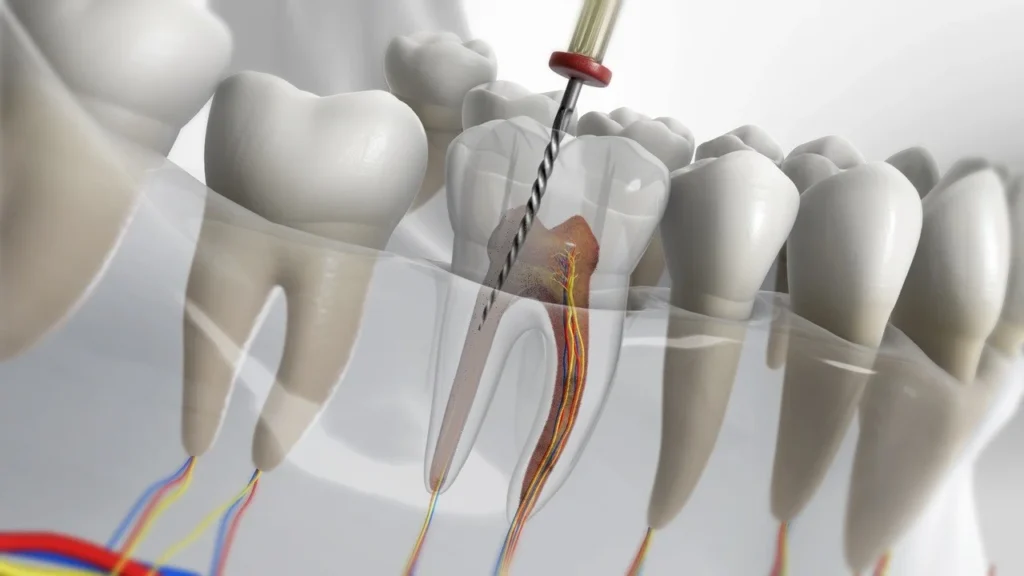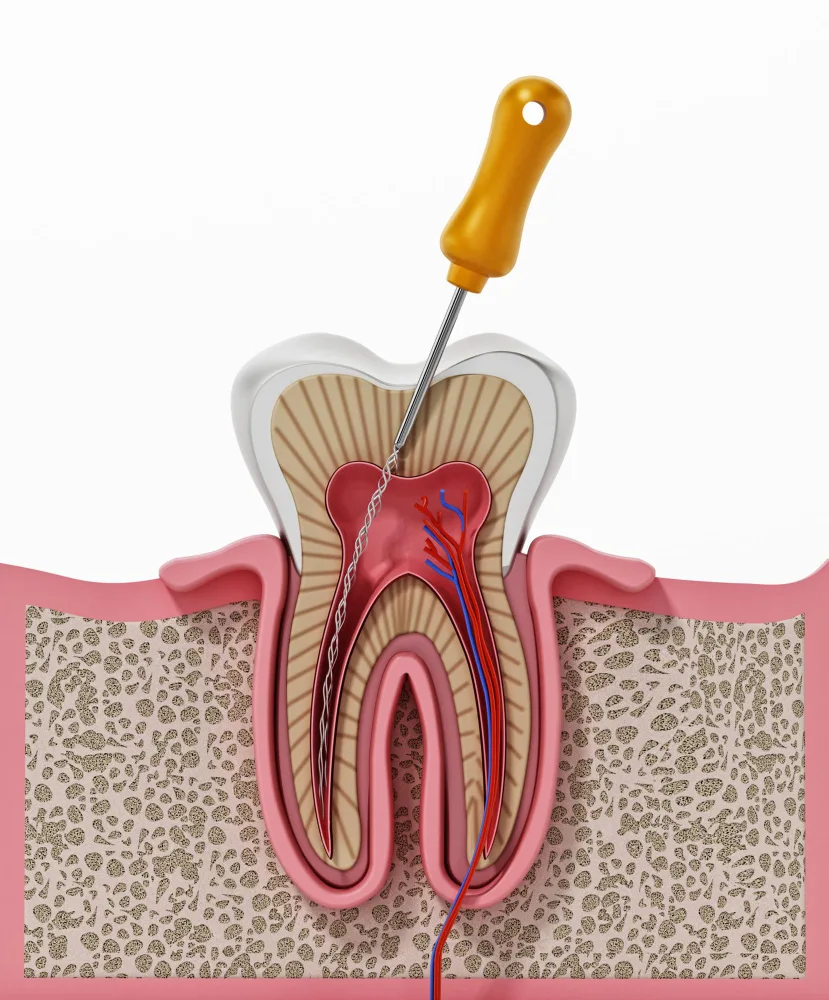- Home
- About Us
- Clinic
- Treatments
- Smile Designing
- Lobuloplasty
- Ear Washing
- Ear Piercing
- Root Canal Treatment
- Teeth Braces
- Clear Aligners
- Sports Nutrition
- weight management
- Disease Management
- Kids Nutrition
- Dental Implants
- Teeth Whitening
- Tooth Extraction
- Tooth Crown
- Full Mouth Rehabilitation
- Dental Bridges
- Dentures
- Teeth Filling
- Teeth Cleaning
- Dental Tourism
- Testimonials
- Contact Us
Dental Root Canal Treatment in Bengaluru, Kannamangala, Kadugodi
HASHTAG SMILE Medical and Dental Aesthetics is the best dental clinic for Dental Root Canal Treatment in Bengaluru, Kannamangala, Kadugodi. In Bengaluru, where various factors like dietary habits, lifestyle stress, and urban living conditions can contribute to dental issues. Timely intervention through root canal therapy not only saves your natural teeth but also restores your ability to bite and chew with ease, ensuring overall dental well-being.

What is Root Canal Treatment (RCT)?
Dental root canal treatment (RCT), also known as endodontic therapy, is a procedure designed to save a tooth that is infected or badly decayed. It involves removing the infected pulp, cleaning and disinfecting the inside of the tooth, and then filling and sealing it to prevent further infection.
Root canal treatment (RCT) helps in preserving the natural tooth structure, maintaining proper chewing function, and protecting surrounding teeth from excessive wear or strain.
With advancements in technology, modern RCT procedures are highly efficient, comfortable, and have a high success rate, offering long-term relief from pain and infection.
Protecting your natural teeth is our priority. We treat various Tooth Condition issues, including infected pulp, decayed tooth, cracked tooth, and infected root, with the expertise of a skilled root canal specialist. Our advanced RCT procedures aim to eliminate infection, relieve pain, and maintain proper chewing function.


Is Root Canal Treatment in Bengaluru Essential?
Bengaluru’s environment presents unique challenges that can lead to dental problems requiring Root canal treatment in Bengaluru:
- Dietary Habits: The high consumption of sugary foods and beverages can lead to tooth decay and infection.
- Water Quality: Concerns about water quality may affect tooth enamel, increasing susceptibility to decay and the need for RCT.
- Stressful Lifestyle: A fast-paced lifestyle can result in poor oral hygiene practices, increasing the risk of tooth decay and infections.
- Access to Dental Care: While Bengaluru has many dental clinics, awareness about preventive dental care may be lacking among some residents, leading to more advanced dental problems requiring RCT.
Given these factors, many residents in Bengaluru require RCT to relieve pain, save their natural teeth, and prevent further complications.
Signs You Need an RCT & How It Can Save Your Tooth
RCT can effectively address several dental issues:
- Tooth Pain and Sensitivity: RCT eliminates the source of pain caused by inflammation or infection in the tooth pulp.
- Infections and Abscess Formation: By removing infected pulp and disinfecting the canals, RCT stops the spread of infection to surrounding bone and tissues.
- Discomfort While Chewing: Decayed teeth can cause discomfort while chewing, impacting the ability to eat properly, which RCT can resolve.
- Foul-Smelling Breath: Accumulation of bacteria in decayed teeth leads to foul-smelling breath, which can be addressed through RCT.
- Weakened Tooth Structure: Advanced decay can weaken the tooth structure, leading to fractures or complete tooth loss, which RCT helps prevent.
- Gum Problems: Decay near the gumline can contribute to gingivitis or periodontitis, causing swollen, bleeding gums and further tooth loss, which RCT aims to avoid.
- Sensitivity from Crown and Bridge Procedures: RCT can treat tooth sensitivity caused by crown and bridge procedures.
- Bone Loss Prevention: RCT for root stumps allows for overdentures, preventing bone loss.
When symptoms like toothache, constant sensitivity, or unexplained swelling appear, RCT may be the solution. Issues such as a darkened tooth, formation of an abscess, or a pimple on gums can indicate serious infection. Our clinic offers precise root canal treatment to restore your dental health effectively.
RCT vs. Extraction: Why Saving Your Tooth Matters
- Pain Relief: RCT eliminates the source of pain caused by inflammation or infection, providing immediate relief.
- Prevents Infection Spread: By removing infected pulp, RCT stops the spread of infection to surrounding bone and tissues.
- Saves the Natural Tooth: A root canal preserves the structure of the natural tooth, preventing the need for extraction.
- Restores Normal Function: Once restored with a crown, the treated tooth can function like a normal tooth, allowing the patient to chew without difficulty.
- Prevents Bone Loss: Retaining the natural tooth prevents bone loss, which often occurs after tooth extraction.
- Cost-Effective: Compared to extraction and tooth replacement options, a root canal is a more affordable long-term solution for saving a tooth.
- Eliminates Tooth Sensitivity: RCT can eliminate tooth sensitivity caused by damaged or infected pulp.
- Reduces Swelling: Eliminates tooth pus and swelling due to decay.
- Enables Internal Bleaching: Internal bleaching can be done after RCT for a discolored tooth.
- Treats Intentional Issues: Intentional RCT can be performed for sensitive teeth and for crown and bridge procedures.
Our clinic helps patients protect their smiles with advanced procedures. You can get expert root canal treatment in Bangalore from a skilled endodontist and experienced dental expert.
We offer root canal treatment if you are dealing with infected pulp, a decayed tooth, a cracked tooth, an infected root, a decayed, cracked, or otherwise unhealthy tooth to prevent further damage. It’s why
Procedure at Hashtag Smile dental clinic for root canal treatment in Bengaluru
We provide advanced root canal treatments led by a skilled endodontist. Our root canal specialist uses the latest techniques to remove infection, clean the canal, and restore the tooth effectively. With the care of our dental expert, patients receive safe, comfortable, and lasting results
1st Consultation
- Conduct a thorough assessment of the patient’s dental condition.
- Take a detailed medical history to identify any underlying health issues.
- Perform an X-ray to evaluate the extent of damage and determine the necessity of root canal treatment (RCT).
- Obtain medical consent if the patient has relevant medical history.
- Administer pre-medication if required to prepare for upcoming procedures.
2nd Appointment
- Schedule the second appointment within five days of the initial consultation.
- Create an access opening in the crown of the tooth to reach the pulp chamber.
- Clean and shape the tooth canals using specialized instruments to remove infected pulp tissue.
- Perform obturation with Gutta Percha, a biocompatible material, to seal the canals and prevent re-infection.
- Place a temporary filling to protect the tooth until the next appointment.
3rd Appointment
- Schedule this appointment approximately three days after the second visit.
- If no pain or discomfort is present, place a permanent filling during this visit.
- Prepare for crown placement by packing a retraction cord around the tooth.
- Take measurements using putty impression material or an intraoral scanner for crown fitting.
4th Appointment
- Conduct this final appointment one to three days after the third visit.
- Perform crown cementation using resin materials to securely bond the crown to the prepared tooth structure.
- Apply bonding agents and etch the tooth surface for strong adhesion.
- Correct high points on the crown with articulating paper for a natural and comfortable bite.
At our clinic, every step of the root canal process is done with precision. We provide dental clinic root canal treatment in Bengaluru that ensures comfort and long-lasting results. Recognized as a leading root canal treatment dental clinic in Bangalore, we take pride in being trusted as the best dental clinic for root canal treatment by our patients.
Equipment and Facilities at Hashtag Smile, Best Dental Clinic for Root Canal Treatment in Bengaluru
Our clinic is equipped with state-of-the-art facilities to ensure optimal care during RCT:
- Sterilization Area: Our clinic maintains a dedicated sterilization area equipped with autoclaves, ultrasonic cleaners, and UV chambers. This ensures all instruments and equipment are thoroughly sanitized, preventing the transmission of infections and ensuring patient safety during every procedure.
- Comfortable Ergonomic Chair: We utilize fully automatic and digital dental chairs with fiber optic connections and built-in torque control motors. These chairs are designed to provide optimal patient comfort and allow dentists to adjust positions for enhanced access and precision during root canal treatment.
- X-ray: Our clinic features advanced digital radiography, which significantly reduces radiation dosage while providing high-resolution images. This crucial imaging technology allows for precise assessment of root canal anatomy, aiding in accurate diagnosis and treatment planning.
- Anesthesia Facilities: We provide comprehensive anesthesia facilities to ensure patients remain comfortable and pain-free throughout the entire root canal procedure. Our options include local anesthesia to numb the area and other techniques to alleviate anxiety and discomfort.
- Sterile Endodontic Instruments: Our clinic utilizes a range of sterile endodontic instruments, including endodontic files, electronic apex locators, and endodontic handpieces. These specialized tools enable precise cleaning, shaping, and measurement of root canals, ensuring effective treatment outcomes.
- Irrigation Equipment: We employ advanced irrigation equipment such as syringes, needles, and ultrasonic activators to thoroughly disinfect and clean the root canal system. This process removes debris and bacteria, promoting a sterile environment for filling and sealing.
- Filling and Sealing Materials: Our clinic uses high-quality filling and sealing materials, including Gutta-Percha points and root canal sealers, to obturate the prepared root canals. These materials ensure a tight, biocompatible seal, preventing future infections and promoting long-term tooth health.
- Rotary Systems: We incorporate rotary systems with motorized handpieces to enhance the efficiency and precision of cleaning and shaping root canals. These systems, often made of nickel-titanium alloy, allow for faster and more accurate canal preparation, even in curved or complex anatomies.
At our root canal dental clinic in Bangalore, we combine advanced equipment and precise techniques to deliver safe and effective treatments. Every procedure is handled by an experienced endodontist and supported by a skilled dental expert. Once the treatment is complete, we restore your tooth with a dental cap for lasting protection. We offer multiple options, including crown after root canal in premium materials like zirconia crown and PFM crown, ensuring strength, aesthetics, and long-term durability.
What to Expect After RCT: Healing Timeline & Tips
- Pain and Sensitivity: Some pain and sensitivity are normal for a few days after RCT. Over-the-counter pain relievers can help manage discomfort.
- Soft Diet: Eating soft foods for the first few days can prevent irritation to the treated tooth.
- Oral Hygiene: Maintain good oral hygiene by brushing and flossing gently.
- Follow-Up: Attend follow-up appointments to ensure the tooth is healing properly.
- Crown Placement: Get a crown placed on the tooth as recommended by your dentist to protect it from fracture and reinfection.
Post-treatment care is just as important as the procedure itself. Our team ensures that patients understand the need for timely crown placement to safeguard their tooth. We also provide clear instructions on oral hygiene after RCT and explain why it’s important to avoid hard foods until healing is complete.
Root Canal Failure: Causes, Symptoms & Next Steps
Root canal treatment is usually successful, but sometimes it can fail due to:
- Incomplete Cleaning: Some canals may be difficult to access, leading to residual infection.
- Missed Canals: Certain teeth have extra canals that may not have been detected during the initial treatment.
- Poor Sealing: If the filling or crown is not properly sealed, bacteria can re-enter and cause reinfection.
- Cracked Tooth: A fracture in the tooth can expose it to bacteria.
If root canal treatment fails, treatment options include:
- Root Canal Retreatment: The old filling is removed, the canals are cleaned again, and the tooth is resealed.
- Apicoectomy (Root-End Surgery): The infected root tip is surgically removed and the area is sealed.
- Tooth Extraction and Implant: If the tooth cannot be saved, extraction followed by a dental implant may be the best option.
At our clinic, we specialize in addressing even the most complex cases. When standard procedures aren’t enough, our advanced microscopic and laser root canal treatment provides the precision needed to target hidden canals and eliminate infection. You can get painless and effective root canal treatment at our facility, where we also offer laser-assisted root canal treatment for maximum accuracy and comfort.
How to Keep Your Teeth Strong & Avoid RCT
Preventing the need for root canal treatment involves maintaining good oral hygiene and addressing dental issues early:
- Brush and Floss Regularly: Brush your teeth at least twice a day and floss daily to remove plaque and prevent decay.
- Regular Dental Check-Ups: Visit your dentist for routine check-ups and cleanings to detect and treat problems early.
- Limit Sugary Foods and Drinks: Reduce your consumption of sugary foods and drinks to minimize the risk of tooth decay.
- Use Fluoride Toothpaste: Fluoride strengthens tooth enamel and helps prevent decay.
- Address Bruxism: If you grind your teeth, talk to your dentist about a mouthguard to protect your teeth from damage.
Prevention matters, and we complement it with precision treatments. Our team offers the best microscopic root canal treatment in Bangalore to handle complex cases with accuracy. Combined with the best painless root canal treatment in Bangalore, we deliver the perfect root canal treatment tailored to your needs.
Root Canal Treatment Cost in Bangalore
The cost of root canal treatment in Bangalore varies based on several factors:
- Complexity of the case, such as the number of canals and any extra canals in back teeth.
- Whether the treatment is performed by a general dentist, root canal specialist or an endodontic specialist.
- The presence of calcified canals, especially in aged patients, or due to traumatic injury or chronic infection.
- The quality of materials used, including medication, disinfectant, rotary files, and filling material.
- Whether it is a single-visit or multi-visit RCT.
- Whether RCT is followed by a post and core procedure.
- Whether it is a re-RCT case, which is typically more complex.
We address even the most complex cases with skill and accuracy. An expert endodontist handles each stage of treatment, supported by top-quality materials. Following the procedure, crown placement is arranged to secure the tooth. Root Canal Treatment In Bangalore at an affordable cost is provided by our clinic, which specializes in advanced and pain-free root canal treatment in Bangalore. We also offer root canal treatment to decayed, cracked or otherwise unhealthy tooth to prevent further damage and maintain oral health.
Typically, RCT cost in Bengaluru starts from ₹6,000, RCT for calcified teeth costs around ₹8,000, and re-RCT costs approximately ₹10,000. Root Canal Treatment in Bangalore is provided at an affordable cost by Hashtag Smile Dental Clinic.
Meet Our Doctors
ENDODONTIST
Dr. Rajaram BDS, MDS
Meet Dr. Rajaram – Your expert micro-endodontist in kannamangala
Dr. Rajaram, a distinguished specialist in Conservative Dentistry and Endodontics, is widely recognized for his exceptional skills, precision, and patient-centric approach. With extensive experience in restorative and endodontic procedures, he is dedicated to preserving natural teeth while ensuring optimal oral health and aesthetics. Dr. Rajaram is one of the best endodontists for root canal treatment in Bangalore
His expertise spans preventive, interceptive, and minimally invasive treatments, focusing on early diagnosis and intervention to prevent extensive dental damage. He is highly skilled in root canal therapy, retreatment of failed root canals, post and core restorations, and aesthetic fillings, all performed with a strong emphasis on pain management and patient comfort.
A firm believer in technology-driven dentistry, Dr. Rajaram utilizes magnification and advanced rotary endodontics, ensuring superior precision in handling complex endodontic cases, calcified canals, and intricate root anatomies. His commitment to continuous learning keeps him at the forefront of evolving dental innovations, enabling him to offer the most efficient and comfortable treatment solutions to his patients.
With his compassionate demeanor and meticulous attention to detail, Dr. Rajaram has earned the trust of countless patients, making him a preferred choice for those seeking high-quality conservative and endodontic care.


ENDODONTIST
Dr. ANSHA BDS, MDS
Meet Dr. Ansha – Your expert micro-endodontist in kannamangala
Specialist in Painless Root Canal Treatment & Microscopic Endodontics
Meet Dr. Ansha Aravind, one of Bangalore’s most trusted endodontists, known for her precision, gentle care, and advanced expertise in root canal treatments. A graduate of Navodaya Dental College and a postgraduate in Conservative Dentistry and Endodontics from the prestigious Bapuji Dental College, Dr. Ansha brings years of clinical excellence and dedication to every procedure. Dr. Ansha provides an excellent root canal treatment in Bengaluru.
At her practice in Kannamangala, near Whitefield, Bangalore, Dr. Ansha specializes in microscopic root canal therapy, retreatment of failed cases, and minimally invasive endodontics. With a strong emphasis on patient comfort, infection control, and lasting results, she has earned a reputation for delivering pain-free and long-lasting dental solutions.
Whether you’re suffering from toothache, deep decay, or a failed root canal, Dr. Ansha is committed to providing advanced, evidence-based treatments in a stress-free environment.
Consult Now
Dental root canal treatment is an essential procedure for saving infected teeth and maintaining overall oral health in Bengaluru. By understanding the benefits and steps involved, individuals can make informed decisions about their dental care. If you are experiencing tooth pain or suspect you may need a root canal, contact our expert team for a thorough evaluation and personalized treatment plan.
FAQ
Root canal treatment, also known as endodontic treatment, is a dental procedure performed to save a tooth that has a severely infected or damaged pulp. The pulp is the soft tissue located inside the tooth, containing nerves, blood vessels, and connective tissue.
During a root canal treatment, the dentist or endodontist removes the infected or damaged pulp from the tooth. The tooth's interior is then carefully cleaned, shaped, and disinfected. Once the canals are thoroughly cleaned, they are filled with a biocompatible material called gutta-percha. This helps to seal the canals and prevent reinfection.
After the root canal procedure, a dental crown or filling is often placed on the tooth to restore its strength, function, and appearance. This protects the treated tooth and allows it to function normally alongside the other teeth.
Root canal treatment is typically performed under local anesthesia, ensuring that the procedure is comfortable and pain-free for the patient. It is a highly effective and common dental procedure that can save a tooth from extraction and preserve natural oral function.
The symptoms of root canal problems can vary from person to person, but some common signs that may indicate the need for a root canal treatment include:
- Persistent tooth pain: Intense and continuous pain in the affected tooth is a common symptom. The pain may be throbbing, sharp, or accompanied by sensitivity to heat or cold.
- Sensitivity to temperature: Increased sensitivity to hot or cold temperatures, even after the stimulus is removed, can be a sign of root canal problems.
- Gum swelling and tenderness: Swelling and tenderness in the surrounding gums may occur near the affected tooth. The gums might appear red, inflamed, or even have a pimple-like bump called an abscess.
- Tooth discoloration: The tooth may appear darker or discolored compared to the adjacent teeth. This discoloration can be a result of damage to the pulp inside the tooth.
- Prolonged sensitivity to pressure: Sensitivity when biting or applying pressure to the tooth is another indication of potential root canal issues.
- Presence of an abscess: An abscess can form at the root of the tooth, causing pain, swelling, and a bad taste in the mouth. It can also lead to the development of a pimple-like bump on the gums.
If you are experiencing any of these symptoms, it is essential to consult with a dentist. They will conduct a thorough examination, possibly including dental X-rays, to determine the cause of your symptoms and recommend appropriate treatment, such as a root canal, if necessary. Early detection and intervention can help save the affected tooth and alleviate any discomfort or pain.
Root canal treatment is often associated with the perception of pain; however, with modern techniques and anesthesia, the procedure itself is typically not painful. The dentist or endodontist will administer local anesthesia to numb the area around the tooth being treated. This ensures that you won't feel any pain during the procedure.
During the root canal treatment, the dentist or endodontist will remove the infected or damaged pulp from the tooth and clean the interior thoroughly. Although you may feel some pressure or vibrations, it should not be painful. If you experience any discomfort, inform your dentist, and they can adjust the anesthesia accordingly.
After the procedure, you may experience some mild soreness or sensitivity in the treated area. This is normal and can be managed with over-the-counter pain medications. Most patients find that any discomfort subsides within a few days.
It's important to note that the purpose of a root canal is to relieve pain caused by an infected or damaged tooth, not to cause pain. By addressing the underlying issue and eliminating the infection, root canal treatment helps to alleviate pain and restore oral health.
If you have concerns about the pain associated with a root canal treatment, discuss them with your dentist. They can explain the procedure in detail, address any apprehensions you may have, and ensure that you are comfortable throughout the process.
RCT starts from 6000
Calcified teeth RCT 8000
Re RCT 10000
Areas We Serve
Kadugodi
7 km from Kadugodi
Kannamangala
850 m from Kannamangala
Whitefield
7 km from Whitefield
Doddabanahalli
3 km from Doddabanahalli
Seegehalli
2.8 km from Seegehalli
Budigere cross
5 km from Budigere Cross
Belathur
4.2 km from Belathur
Avalahalli
3 km from Avalahalli
Ardendale
200 m from Ardendale
Bevina Mara
800 m from Bevina Mara

